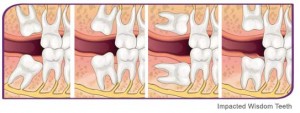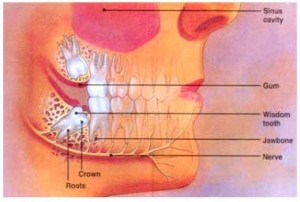972-241-4433
In over a Decade, Dr. Haghiri has done thousands of surgical procedures including removal of Impacted Wisdom Teeth, Dental Implants, Bone grafting, Sinus lifts, and Oral Biopsies.

American Dental Center offers many choices of sedation treatments and advice for care after wisdom teeth surgery. Many of our patients like to have Oral or Nitrous Oxide sedation for their extraction appointments. Whether or not this is recommended, depends on the patient. If the patient has no anxiety about the appointment, sedation isn’t necessary. If the patient is worried about the appointment, our advice is to start with Oral sedation. This can be sedative pill, which will be prescribed by Dr. Haghiri such as Triazolam or Valium. the patient will need to have an escort after the appointment.
Many people have problems with wisdom teeth. Very frequently, there is not enough room for them to erupt into the arch normally, or they attempt to come in sideways or have other similar difficulties. They then become impacted, that is, impeded from normal eruption.
If this is the case, our advice is to have them removed at your earliest convenience. Experience has shown that complications from wisdom tooth surgery greatly increase with advancing age. If, however, they can be removed in the late teens or early twenties, complications are much milder and less likely to occur.
Wisdom teeth can be a source of serious, even life-threatening infections that can swell to close off your breathing or can spread to your brain.
Dr. Haghiri is a General Dentist, providing wide variety of surgical procedures related to oral health with a cost that is not comparable with services offered at any Dental specialist or an Oral Surgeon Office. Dr. Haghiri enjoys dental surgery and her experience alone makes her a master in her craft.
Immediate post-operative advice for tooth extractions (while you are still in the dental office):
- Sit still for a few minutes immediately after the appointment. You want to be sure that a blood clot has formed before you get up and around, because you could provoke bleeding. The amount of time you need to sit still varies with the type. If this was a baby tooth that was close to coming out on its own, you may only need one or two minutes of sitting still. For the simple removal of an adult tooth, you may need to sit for about ten minutes. For a surgical extraction in which stitches were necessary, it could be half an hour or longer. This amount of time could be longer if you tend to bleed longer than most people.
- You will be biting on a gauze while you are waiting. This keeps pressure on the site and assists in stopping the bleeding.
- Advice on what to do after you leave the dental office:
- After you leave the office, you should be somewhat still, without strenuous activity, for about two hours. Don’t suck or spit, as this will inhibit the formation of a blood clot.
- Some persistent bleeding is normal. Expect your saliva to be tinged with blood for several hours.
- However, if you notice thick bleeding with dark red blood clots, you need to apply more pressure to the site. Most dental offices give you a pack of gauze in case this occurs. If you don’t have gauze, use a paper towel. Wad it up so it puts pressure directly on the site, and bite on it for a good forty-five minutes. If the bleeding still hasn’t stopped, repeat this. If it still doesn’t stop, call the dentist or go to the hospital emergency room.
- For pain, after a simple extraction, you should be able to take Tylenol or ibuprofen, or another over-the-counter pain remedy.
Advice on what to do after a surgical tooth extraction:
- You should follow the above three instructions on bleeding.
- For pain medication, you’ve probably been given a prescription pain reliever. This prescription should be taken as needed for pain. There isn’t a strict prescribed schedule, but you should take the medication according to your individual needs.
- There will be swelling afterward. The more extensive the surgery that was required to remove the tooth, the more swelling there will be. Swelling occurs the first day and then usually peaks the second day. If you continue to swell beyond the second day, you should contact Dr. Haghiri as you may have developed an infection.
- You can minimize the swelling in two ways: with ice packs applied to your face near the surgery for the first two days, and then by keeping your head elevated at night. Use an extra pillow. A raised head keeps fluids from accumulating in the head area.
- Keep the area of the surgery as clean as you can. The gentlest rinse you can use, when you’ve had a surgical incision, is warm salt water. You mix about half a teaspoon of salt in an eight-ounce cup of water, and then swish with that.
- Starting the day after surgery, you can brush the teeth next to the extraction site. Do this gently, however, because there is a risk of tearing the tissue that has just been sutured. Brush only your teeth, not the gums.
- Food particles promote the growth of bacteria, which cause infections. You need to get rid of these food particles for proper healing. If it was wisdom teeth that were removed, it’s going to be hard to keep the area clean, but it’s going to be extra important, because those surgical sites are some of the most prone to getting infected.
- Eat only soft things the day of the surgery fluids, milk, ice cream, puddings, shakes, etc.
- Starting the second day, you can start trying to eat other foods only if you feel up to it. The best advice here is to listen to your body and not push yourself to eat things you don’t have the strength to chew.
- You will have pain and it may be hard to open your mouth very far. This is normal.
- Your pain should lessen and your ability to open your mouth should improve some each day. If these things don’t get better, it could signal an infection and you should call your dentist.
For a free consultation with Dr. Haghiri about tooth extractions and impacted wisdom teeth removal, please call our Dallas office at: 972-241-4433.
American Dental is easily accessible from Carrollton, Farmers Branch, Addison, Coppell, Irving and other cities in Dallas County.
